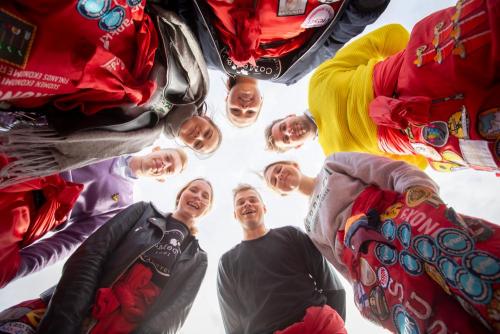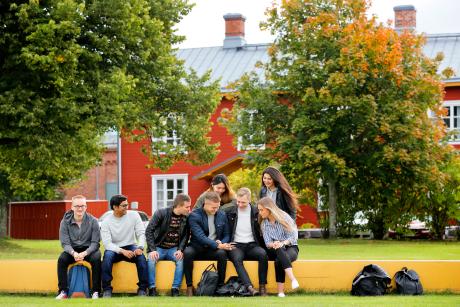Studying at the University of Vaasa
The Finnish educational system is made up of the comprehensive school, upper secondary school or vocational education, and higher education. Higher education is provided by 13 universities and 23 universities of applied sciences.
In accordance with the Universities Act, Finnish universities are independent corporations under public law or foundations under private law (Foundations Act). They work on the principles of academic freedom and autonomy and are independent in their decision-making. All universities are state-run.
Universities confer Bachelor's and Master's degrees, and postgraduate licentiate and doctoral degrees. Universities must promote free research and scientific and artistic education, provide higher education based on research, and educate students to serve their country and humanity. In carrying out this mission, universities must interact with the surrounding society and strengthen the impact of research findings and artistic activities on society.
University education is at present divided into different basic fields of study. For each field of study, there are statutes, defining the objectives, structure and extent of the basic degree. More explicit directions for the contents and structure of the degrees are given in the degree ordinance and regulations, formulated by the institutions for their instruction.
For more information visit the Ministry of Education and Culture's website.

ECTS Credit System
ECTS, ‘European Credit Transfer System’, was developed by the Commission of the European Community in order to provide common procedures to guarantee academic recognition of studies abroad. It provides a way of measuring and comparing learning achievements and transferring them from one institution to another.
The ECTS system is based on the principle of mutual trust and confidence between the participating institutions. The few rules of ECTS, concerning information (on courses available), agreement (between the home and host institutions) and the use of credit points (to indicate student workload) are set out to reinforce this mutual trust and confidence of content but also adding credits to each course.
ECTS Credits
ECTS credits are a value allocated to course units to describe the student workload required to complete them. They reflect the quantity of work each course requires in relation to the total quantity of work required to complete a full year of academic study at the institution, that is, lectures, practicals, seminars, private work – in the library or at home – and examinations or other assessment activities. ECTS credits express a relative value.
One ECTS is equivalent to about 27 hours of work. In ECTS, 60 credits normally represent the workload of a year of full time studies, 30 credits per semester (20 credits per semester in the three-semester system). At the University of Vaasa, 1 credit unit is equivalent to 1 ECTS from 1 September 2005 onwards.
Finnish credits often show the quantity of work each course requires in relation to the total quantity of work required to complete a full academic degree rather than the relation to the workload of a full academic year. The variations in the required workload for one academic year in different disciplines and levels of study are not reflected in the credit system. Variations in the workload naturally imply differences in the number of years of study necessary for the completion of a degree. This should be taken into consideration when using ECTS credits.
| Finnish Scale | ECTS Scale | Explanation |
|---|---|---|
| 5 | A | Erinomainen/Excellent |
| 4 | B | Erittäin hyvä/Very Good |
| 3 | C | Hyvä/Good |
| 2 | D | Tyydyttävä/Satisfactory |
| 1 | E | Välttävä/Sufficient |
| HYV. | Pass. | No grading scale, in other words, course is evaluated only on pass/fail basis and cannot be graded. This is used mainly for courses that require only sufficient participation in the classes. |
| HYL. | F | Fail (F)/ Hylätty (Hyl) = More work is required before the credit can be awarded. |
Mixed study groups
The language of instruction in all the courses offered for international students is English. Courses are typically based on lectures with a final examination, or on independent reading which is examined during the academic year. In addition, there are seminars and various forms of group work with written and oral assignments.
The courses included in the Master’s programmes, and most courses for exchange students, are offered for both international and Finnish students, which means that you will have a good opportunity to get to know students both from Finland and from all over the world. The internationally mixed study groups offer a great chance to learn not only from the lecturers but also from the other students and their experiences.
Library and Study Material
Tritonia
Tritonia is a joint academic library of higher education institutions in Vaasa. It is situated in the campus area of the university in Palosaari. Tritonia contains material pertaining to all the university’s fields of teaching and research. The collections comprise over 300 000 volumes, and the library subscribes to nearly 900 periodicals. In addition, access to thousands of e-books and e-journals is given.The library also offers short courses in how to use the library and its databases.
Study Materials
The cost of study material may vary from field to field. Most of the course literature is available at the academic library Tritonia or in the city library. Their services are free of charge. Please notice, however, that it might be necessary sometimes to buy some books to use them as reference books at home.
Student Union of the University of Vaasa
The purpose of the Student Union of the University of Vaasa (VYY) is to unite students and promote their social and spiritual ambitions. VYY is there for its members - its function is to connect its members and enhance their societal, social and mental welfare. The Student Union and its activities are based on active members, and thus every member has an opportunity to influence the future development of the Student Union. VYY is also a member of the National Union of Finnish Students (SYL), whose purpose is to promote students' rights and formulate policies on a national level.
Membership
- For Degree and Double degree students, the membership is compulsory. Degree students must pay the student union membership fee in the beginning of each academic year if they register as attending for that year.
- For exchange students and doctoral students, the membership is optional.
Student Discounts
As members of the Student Union of the University of Vaasa, students are entitled to various discounts on and off campus, such as lunch discounts and lower prices for train or bus tickets. Discounts will be given by showing the student card, that is either an electronic or a plastic card. Discount is not necessarily offered for a holder of an international student identification card. To obtain the student card, students need to register as attending, pay the Student Union membership fee and fill in an electronic application form for the card.
If you order the plastic card, there is a longer waiting time for them. In the meantime, if you already need a proof of being a student, you can get a Certificate of Attendance in the Peppi system. To be able to get the certificate, you also must register as attending first.
More information about discounts and student cards is available on Student Union's website below.

I'm so grateful to be a part of UVA community for the past two years, receiving such supports and kindness from you, all university staffs and proffessors. Without any hesitates, I'm so proud of being a graduate from UVA.
- Vu Kim Thoa, graduated in Spring 2020
ESN Vaasa
Erasmus Student Network (ESN) is the biggest student association in Europe. ESN Vaasa is one of the sections of ESN Finland. The activity is made possible by ESN Vaasa's board and active members and it is mostly visible to students in the form of events and possible projects that the roof organization continuously drives forward. ESN Vaasa organizes different sort of events and activities to all international students of higher educational institutes in Vaasa and the core aim is to help foreign and Finnish students to get to know each other and of course to share new experiences.
ESN Vaasa's different events are a great way to get to know both your own and other schools' international and internationally-minded students. All the continents are constantly represented in Vaasa's exchange and degree student population and this creates an open atmosphere!